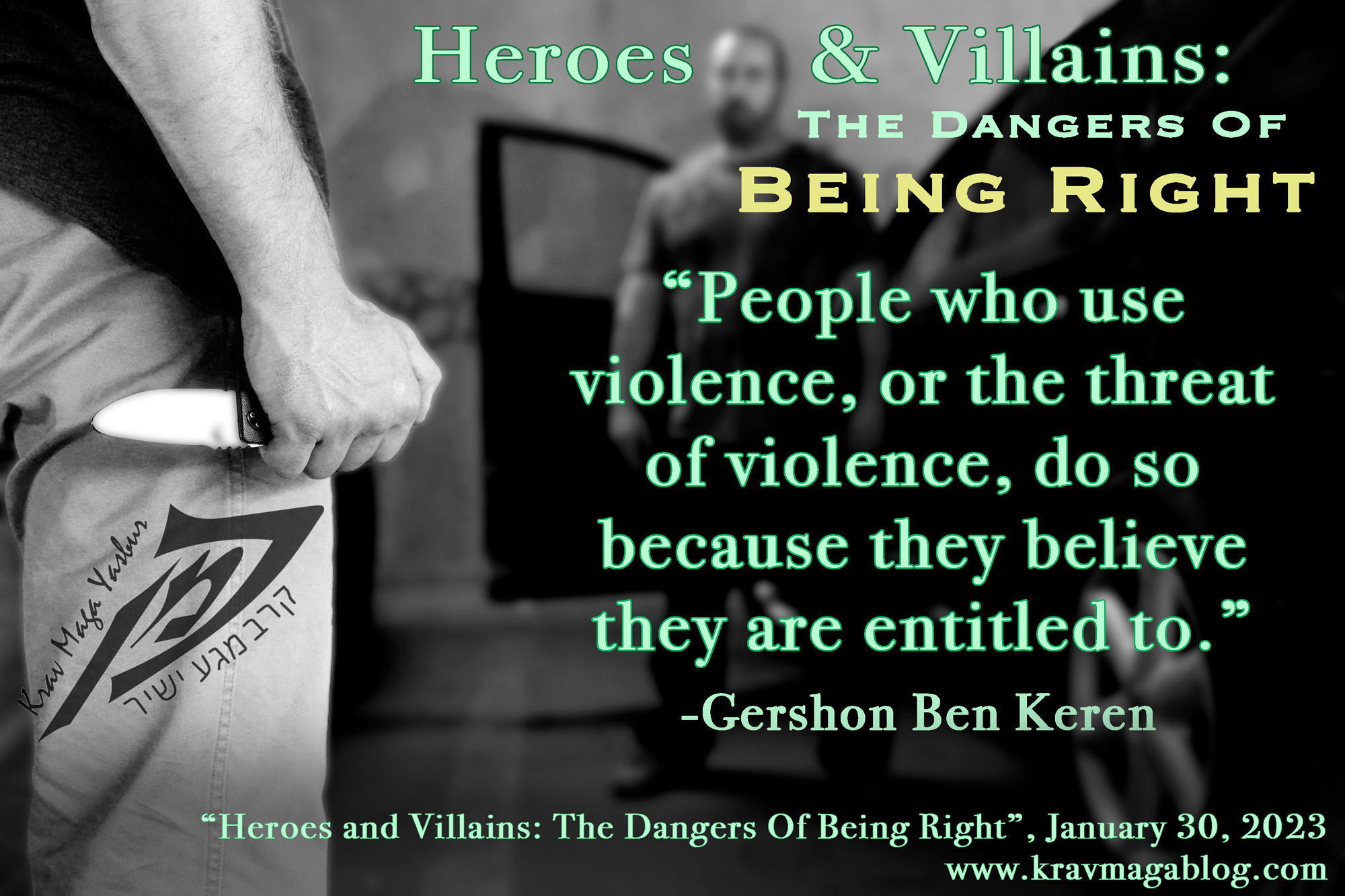Author: Gershon Ben Keren

Many years ago, when I was still living and working in the UK, I was asked to make a sales pitch, to a Health and Safety Director concerning some personal safety/self-protection training that they wanted to provide for their employees. It so happened that on the morning I was about to do so, the London papers had just reported on an incident where a WWII veteran had been stabbed to death after refusing to hand over his wallet to two muggers. In the eyes of the Health and Safety Director, as well as the media/general public, the victim had been in the right, in hanging onto his wallet. The general pitch of the story, as presented to the public, was a contrast between the personalities of those involved i.e., the muggers were cast as individuals who had no values, morals, or sense of purpose (a reflection on UK youth and modern society etc.), and the person victimized (an upstanding, righteous, moral, hero of WWII, who had stood up to two bullies etc.). The media often frames such news stories in these simplistic terms, casting those involved as either heroes or villains, good or bad, noble or deviant etc., without any further investigation into who the characters involved actually are. Whilst I am sure there is a part in all of that admires the fact that this elderly individual stood up for the values he believed in and didn’t acquiesce to the demands of two individuals committing an offense etc., I’m not sure that his family members necessarily felt the same way, because they had to bear the cost of losing a loved one. I’m guessing that at the end of the day they would have rather had him hand over his wallet, and potentially still be alive, than stand up for a value/belief that got him killed. In street robberies those committing them always believe that they are walking away with whatever they demanded, with the variable being whether they have to use force/violence to obtain their goal(s), which is why from a “survival” perspective it is better to start the interaction by complying; a different response may be needed, later on based on their reactions, but as a starting point compliance is usually best. In this article I want to look at the potential danger(s) of looking at violence from the perspective of heroes and villains.
In some situations/incidents there are clear “rights and wrongs” e.g., two muggers demanding the wallet of an elderly man is morally and legally “wrong”; the roles of offender and victim have been clearly drawn - the news media likes simple stories where there are few grey areas and a simple narrative. However, a large number of violent incidents are the result of social interactions, where all parties involved believe they are in the right. It is worth noting that even the most persistent offenders are able to convince themselves that they are entitled and justified to commit their crimes, such as making arguments to themselves that if society had dealt them a better hand, they wouldn’t have to engage in offending etc. People who use violence, or the threat of violence, do so because they believe they are entitled to. Two individuals who end up in a parking lot fight over a parking space, both believe that they are in the right, and the other person is in the wrong. Both assume that the other is working to the same belief/value system that they are. One party may believe that because they have been looking for a spot for 15 minutes, it should be theirs, whereas the other person who just entered the lot, may believe that they are entitled to it, because they saw it first etc. Both parties may feel/believe that they have to stand up for their rights, and challenge the other person, however nobody is really right or wrong in this situation; both from their perspective, have a case and argument to make in this dispute. However, it is highly unlikely that either will get the other to understand and accept their point of view. Even if one party decides to walk away there is nothing to say that they won’t come back later to seek revenge – either on the vehicle or the other driver. Standing up for your rights, usually comes at a cost, because the other person sees it as “losing” their own.
It’s also worth remembering, that it is other people who recognize you as a “hero”. You don’t get to claim that for yourself. The news media, and the general population, may be happy to present your actions as being heroic, and maybe even more so if there is a tragic ending, however those closest to you, might wish you hadn’t been, and that you’d either complied with a demand for your wallet, and/or walked away from a dispute in a parking lot, that could have had a fatal ending. Living in the US, I am well aware that in any argument you get into there is the potential for a firearm to be pulled, and having lived in the UK, I always assumed that any person I might have an aggressive interaction with would be carrying a knife. I also know from firsthand experience that when someone pulls a weapon, they usually end up using it, even when the other person backs down. There are times when physical solutions are necessary, but not just because of a need to be “right” or a “hero”. This would be a fight for ego, and ego is never a reason to fight.